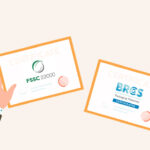Flexible Intermediate Bulk Containers (FIBCs), often called bulk bags, are large, durable bags made from woven polypropylene. They are designed to carry and store a wide range of dry, flowable products, such as grains, chemicals, and construction materials. With their sturdy design and capacity to hold between 500 to 2000 SWL, FIBCs are used in many industries, including agriculture, food processing, and chemicals. Their versatility, strength, and cost-effectiveness make them an ideal solution for businesses needing to move or store bulk materials safely and efficiently.
In business, FIBCs play a key role by making logistics, packaging, and storage easier and more efficient. They allow companies to transport large quantities of materials at once, reducing handling time and improving overall productivity. FIBCs also help in reducing packaging costs since their lightweight nature requires less material compared to other types of packaging. Moreover, their stackable design makes them space-efficient, allowing businesses to store more in limited spaces, which further enhances their usefulness in a wide range of operations.
What Are Flexible Intermediate Bulk Containers (FIBC)?
Flexible Intermediate Bulk Containers (FIBCs) are large bags made from woven polypropylene fabric, designed to carry bulk materials like powders, grains, or chemicals. These containers are known for their strength and durability, allowing businesses to transport and store large quantities safely. The basic structure of an FIBC includes handles, also known as loops, which make lifting and transporting easier. Many FIBCs also come with spouts or closures, allowing for easy filling and emptying.
There are different types of FIBCs, each designed for specific uses:
- Type A FIBC: These are standard bags with no special properties. They are suitable for transporting non-flammable materials.
- Type B FIBC: These bags offer extra protection by preventing sparks from static electricity but cannot safely handle highly flammable materials.
- Type C FIBC: These are conductive bags designed to be grounded during use. They are ideal for transporting flammable materials in environments where there’s a risk of static buildup.
- Type D FIBC: These are anti-static bags that prevent static discharge without needing grounding. They are used in situations where static could cause safety concerns.
Each type of FIBC serves a specific function, ensuring that businesses can choose the right one based on the material they are transporting and the environment in which they operate.
Key Features of FIBC
Flexible Intermediate Bulk Containers (FIBCs) offer several key features that make them highly practical for businesses handling bulk materials.
Versatile Size and Weight Capacity
FIBCs come in a variety of sizes and can hold between 500 to 2000 SWL of material. Their capacity makes them useful for different industries, and they can be customized to meet specific needs. Whether a business handles small batches or large volumes, FIBCs can be adjusted in size and shape to fit the requirements.
Reusability and Sustainability
Many FIBCs are reusable, which helps reduce the need for single-use packaging. This reusability makes them an environmentally friendly option. Since they are made from recyclable polypropylene, businesses can recycle these containers at the end of their lifecycle, supporting sustainable business practices.
Customization Options
FIBCs can be customized with liners that provide extra protection for moisture-sensitive materials. This makes them suitable for handling products that require specific storage conditions. Additionally, businesses can print branding or product details directly on the bags, making them both functional and a tool for marketing.
Stackable and Space Efficient
FIBCs are designed for easy stacking, which helps save space in warehouses and during transportation. Their ability to be packed tightly ensures that businesses can maximize storage efficiency and reduce shipping costs, making FIBCs a space-saving solution for bulk material management.
How FIBC Benefit Your Business
Flexible Intermediate Bulk Containers (FIBCs) offer a range of benefits that can significantly improve business operations.
Cost Efficiency
FIBCs help lower packaging costs by using minimal material compared to traditional packaging methods. Their lightweight design allows businesses to transport large volumes of goods while keeping shipping costs low. This makes them a cost-effective option for businesses looking to reduce expenses without compromising on quality.
Simplified Handling and Transportation
FIBCs are designed for easy handling. With built-in loops, they can be lifted by forklifts or cranes, making loading and unloading faster and requiring less manual labor. This efficiency helps streamline operations and reduces time spent on logistics, improving overall productivity.
Enhanced Product Safety
FIBCs provide strong protection for products, guarding against contamination, moisture, and physical damage. They are especially useful for transporting delicate, hazardous, or bulk goods. For example, food-grade FIBCs are available for the food industry, while anti-static FIBCs are designed for chemicals, ensuring that products remain safe during storage and transit.
Scalability for Growing Businesses
As businesses expand, FIBCs offer flexible solutions that scale easily. They allow companies to handle larger volumes of goods without increasing packaging costs, making them ideal for businesses looking to grow while keeping expenses under control.
Reduced Environmental Impact
FIBCs are made from recyclable materials, offering an eco-friendly packaging option. By using FIBCs, businesses can reduce their reliance on single-use plastics, contributing to more sustainable supply chains and supporting environmentally responsible business practices.
Industries That Benefit from FIBC
Flexible Intermediate Bulk Containers (FIBCs) are used across many industries due to their strength, versatility, and ability to handle bulk materials efficiently.
- Agriculture: FIBCs are commonly used in agriculture to transport seeds, grains, and fertilizers. Ventilated FIBCs are available for produce, helping to maintain freshness by allowing airflow, which is crucial for crops like potatoes or onions.
- Construction and Mining: n construction and mining, FIBCs are essential for moving heavy and bulky materials like sand, gravel, and minerals. These bags are designed to handle tough industrial conditions, offering durability and reliability for transporting materials that require strength.
- Food and Beverage: The food industry uses FIBCs to package and transport dry food items such as sugar, flour, and spices. Food-grade FIBCs are available, often with liners, to provide extra protection and ensure that products remain clean and safe during transit and storage.
- Chemicals and Pharmaceuticals: FIBCs are used to safely transport powders, granules, and hazardous chemicals in the chemical and pharmaceutical industries. Anti-static and conductive FIBCs prevent static buildup, which can be a safety risk, making them an ideal solution for handling flammable or sensitive materials.
Safety and Best Practices for FIBC Use
When using Flexible Intermediate Bulk Containers (FIBCs), following safety and best practices is essential to ensure smooth operations and avoid accidents.
Safe Handling and Storage Guidelines
It’s important to handle FIBCs properly to avoid damage and ensure the safety of workers. Use forklifts or cranes with proper lifting techniques, ensuring the loops are securely attached to the equipment. When storing FIBCs, stack them in a stable and controlled environment, avoiding over-stacking or placing them in unsafe conditions that could lead to accidents or product damage.
Avoiding Electrostatic Hazards
For materials that are sensitive to static electricity, it’s crucial to use Type C or Type D FIBCs. Type C bags must be grounded to safely disperse static, while Type D bags offer built-in protection against electrostatic buildup without the need for grounding. This helps prevent fires or explosions, particularly in environments dealing with flammable materials.
Ensuring Compliance with Industry Standards
To ensure safe use, FIBCs must comply with relevant industry regulations and standards, such as ISO certifications and UN guidelines for transporting hazardous materials. Adhering to these standards helps businesses avoid regulatory issues and ensures that FIBCs are used in a manner that prioritizes safety and reliability.
In conclusion, Flexible Intermediate Bulk Containers (FIBCs) represent a smart investment for your business. They offer significant cost savings, enhance efficiency in handling and transportation, ensure product safety, and support sustainable practices through reusable materials. By switching to FIBCs, businesses can streamline logistics and reduce expenses while promoting an eco-friendly approach to packaging. If you’re looking to improve your bulk packaging needs, consider FIBCs from Anita Plastics. Our durable and customizable solutions are designed to meet the demands of various industries, ensuring you get the best value and reliability. Contact us today to explore how FIBCs can benefit your operations!




